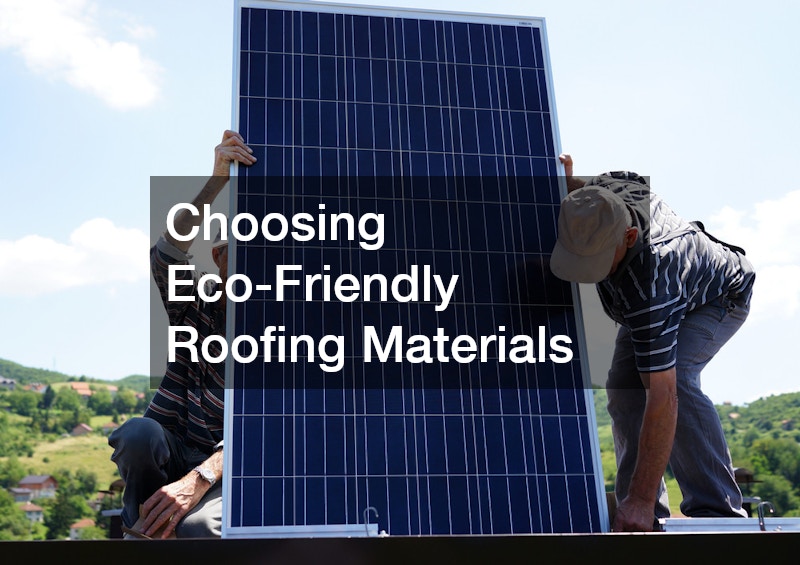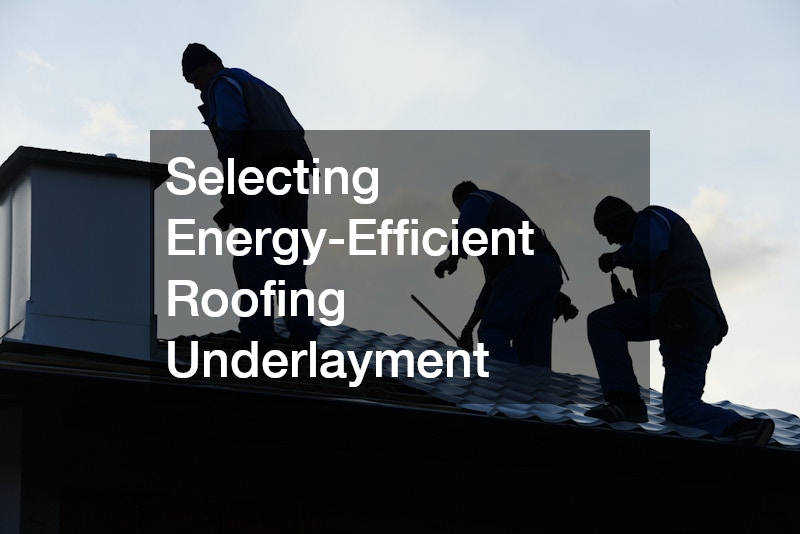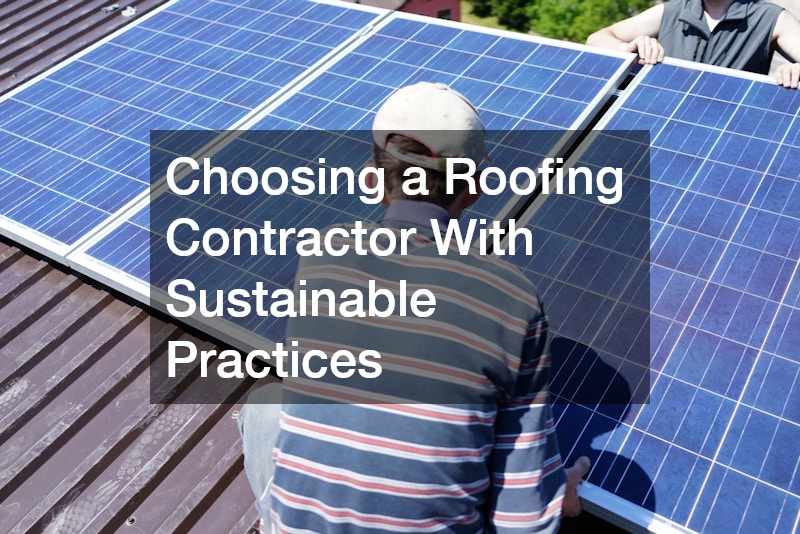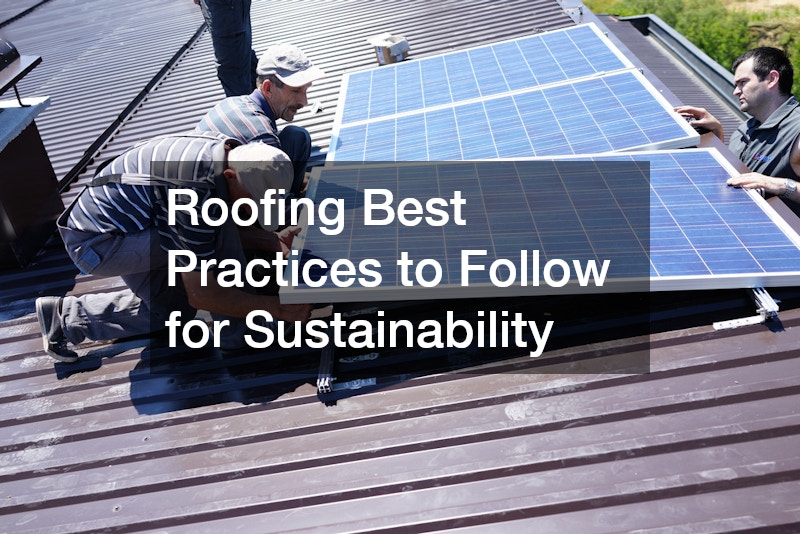In today’s world, it’s essential to consider eco-friendly practices in all aspects of our lives, including home improvement projects. One area where sustainability can make a significant impact is in the choice of roofing materials and practices. By opting for eco-friendly roofing solutions, homeowners can not only reduce their impact on the environment but also save on energy costs in the long run. In this article, we will explore various roofing best practices that promote sustainability and energy efficiency.
Choosing Eco-Friendly Roofing Materials

When selecting roofing materials for your home with roofing best practices, it’s crucial to choose options that are both durable and environmentally friendly. Many roof companies now offer a wide range of eco-friendly choices, such as metal roofing, recycled shingles, or sustainable wood products. These materials not only reduce the environmental impact of your roof but also provide excellent insulation, contributing to energy efficiency.
Working with a reputable roofing contractor can help you evaluate the best eco-friendly options for your home and ensure proper installation. By prioritizing sustainability in your roofing project, you can make a positive impact on the planet while enjoying a long-lasting and efficient roof.
Roof replacement contractor can provide expert guidance on choosing the most sustainable materials for your roof, taking into account factors like durability, recyclability, and energy efficiency. By investing in high-quality and eco-friendly roofing materials, homeowners can reduce their carbon footprint and create a more sustainable living environment.
Reflective and Cool Roofs: Reducing Energy Costs
Reflective and cool roofs are innovative solutions that can significantly reduce energy costs and improve indoor comfort. By installing a reflective roof, homeowners can lower cooling costs by reflecting sunlight and reducing heat absorption. Cool roofs, on the other hand, are designed to reflect and emit the sun’s heat, keeping the building cooler and reducing the need for air conditioning.
Working with a knowledgeable roofing contractor can help homeowners determine the best option for their specific needs and climate conditions. By incorporating reflective or cool roofs into their homes, homeowners can not only save on energy expenses but also contribute to a more sustainable future.
Roofing best practices advocate for the use of reflective and cool roofs to minimize the heat island effect in urban areas and promote energy efficiency. By adopting these innovative roofing solutions, homeowners can make a positive impact on the environment while enjoying reduced cooling costs and improved indoor comfort.
Proper Roof Insulation for Energy Efficiency
Proper roof insulation is essential for maintaining energy efficiency and reducing heating and cooling costs in your home. A well-insulated roof can prevent heat loss during the winter and keep your home cool in the summer, reducing the need for constant heating and cooling. By working with a roof replacement contractor, homeowners can ensure that their roof is properly insulated to maximize energy efficiency.
Roofing best practices recommend the use of environmentally friendly insulation materials, such as recycled cellulose or wool, to reduce the environmental impact of your roof. Proper insulation not only improves energy efficiency but also increases the overall comfort of your home by maintaining consistent indoor temperatures throughout the year.
Local roofing companies specializing in energy-efficient solutions can help homeowners choose the best insulation options for their roofs. By investing in proper insulation, homeowners can lower their energy bills, reduce their carbon footprint, and create a more sustainable living space.
Using Solar Panels on Your Roof

Installing solar panels on your roof is a great way to harness renewable energy and reduce your dependence on non-renewable resources. Solar panels can generate clean electricity for your home, reducing your energy bills and environmental impact. By working with roof replacements experts experienced in solar installations, homeowners can seamlessly integrate solar panels into their roofing system.
Solar panels not only provide a sustainable energy source but also increase the value of your home and qualify you for various rebates and incentives. By choosing to go solar, homeowners can contribute to a greener future while enjoying long-term savings on their energy costs.
Roofing best practices emphasize the importance of incorporating solar panels into your roofing system to promote sustainability and energy independence. With advancements in solar technology and installation methods, it’s now easier than ever to go solar and reap the benefits of clean, renewable energy.
Installing Green Roofs for Environmental Benefits
Green roofs are becoming increasingly popular as a sustainable roofing solution that offers a wide range of environmental benefits. By installing vegetation and greenery on your roof, you can improve air quality, reduce stormwater runoff, and provide habitat for local wildlife. Green roofs also offer excellent insulation properties, reducing energy consumption and lowering cooling costs.
Working with a reputable roofing services provider that specializes in green roof installations can help you create a beautiful and eco-friendly living space. Green roofs not only enhance the aesthetics of your home but also contribute to a healthier environment by promoting biodiversity and reducing your carbon footprint. They can also help regulate temperatures, improving indoor comfort year-round.
Local roofing companies with expertise in green roof technologies can guide homeowners through the installation process and help them choose the most suitable plants and materials for their green roof. By investing in a green roof, homeowners can enhance their property’s value, increase energy efficiency, and contribute to a more sustainable future.
Roofing Maintenance for Long-Term Sustainability
Regular roofing maintenance is essential for ensuring the long-term sustainability and performance of your roof. By scheduling routine inspections and repairs, homeowners can identify and address minor issues before they escalate into costly problems. Local roofing companies specializing in maintenance services can provide expert guidance on upkeep and preventive measures.
Roofing best practices recommend conducting annual maintenance checks to assess the condition of your roof and address any potential issues promptly. By investing in regular maintenance, homeowners can prolong the lifespan of their roofs, improve energy efficiency, and minimize the need for extensive repairs in the future.
Local roofers with a focus on sustainability can help homeowners develop personalized maintenance plans tailored to their roofing system and environmental conditions. By prioritizing regular upkeep, homeowners can ensure the longevity and performance of their roofs while reducing their impact on the environment.
Selecting Energy-Efficient Roofing Underlayment

Choosing energy-efficient roofing underlayment is a crucial step in enhancing the overall sustainability and performance of your roof. Energy-efficient underlayment can provide additional insulation and moisture resistance, improving the energy efficiency of your home. Local roofers with expertise in sustainable practices can help you select the most suitable underlayment for your roofing system.
Roofing best practices emphasize the use of environmentally friendly underlayment materials, such as recycled rubber or synthetic polymers, to enhance the energy efficiency of your roof. By opting for energy-efficient underlayment, homeowners can reduce heat loss, improve indoor comfort, and lower their heating and cooling costs. This, in turn, supports your home’s overall energy performance and reduces your carbon footprint.
Local residential roofers specializing in energy-efficient solutions can install high-quality underlayment that complements your roofing materials and maximizes energy savings. By investing in sustainable underlayment, homeowners can create a more eco-friendly and energy-efficient living space. This investment not only improves your home’s comfort but also offers long-term financial benefits by reducing energy consumption.
Rainwater Harvesting and Roof Design
Rainwater harvesting is a sustainable practice that can help homeowners conserve water and reduce their reliance on municipal sources. By incorporating rainwater harvesting systems into their roof design, homeowners can collect and store rainwater for various non-potable uses, such as irrigation or laundry. Working with local roofing companies experienced in rainwater harvesting can help homeowners integrate these systems seamlessly into their roofing structure.
Roofing best practices encourage the use of rainwater harvesting systems to promote water conservation and sustainability. By capturing rainwater from your roof, you can reduce your water bills, lessen the strain on local water resources, and enhance the overall eco-friendliness of your home.
Local roofing companies with expertise in rainwater harvesting technologies can help homeowners design and install efficient rainwater collection systems that meet their specific needs and regulatory requirements. By embracing rainwater harvesting, homeowners can take a significant step towards environmental stewardship and resource conservation.
Minimizing the Environmental Impact During Roof Replacement
Roof replacement is a significant home improvement project that can have a substantial environmental impact if not done thoughtfully. By working with a roof installation company committed to sustainable practices, homeowners can minimize waste generation, recycle old materials, and choose eco-friendly alternatives. Roofing best practices advocate for responsible disposal and recycling methods during roof replacement to reduce landfill waste and promote environmental conservation.
Roof installers with a focus on sustainability can help homeowners select eco-friendly roofing materials that are durable, energy-efficient, and recyclable. By choosing sustainable options during roof replacement, homeowners can reduce their carbon footprint, improve energy efficiency, and contribute to a more sustainable building industry. These practices ensure that the new roof contributes positively to both your home’s comfort and the planet’s well-being.
Local residential roofers specializing in environmentally conscious practices can guide homeowners through every step of the roof replacement process, from material selection to waste management. By prioritizing sustainability during roof replacement, homeowners can transform their homes into eco-friendly and energy-efficient spaces. These upgrades also enhance property value while aligning with eco-conscious values that can benefit future generations.
Reducing Roof Heat Island Effect in Urban Areas
The heat island effect is a common phenomenon in urban areas where buildings and pavement absorb and retain heat, leading to higher temperatures and increased energy consumption. By choosing energy-efficient roofing materials and adopting sustainable practices, homeowners can reduce the heat island effect and lower their cooling costs. Best practices emphasize the use of reflective and cool roofs to minimize heat absorption and create a more comfortable urban environment.
Roofing best practices also recommend the incorporation of green roofs, solar panels, and other sustainable features to mitigate the heat island effect and promote energy efficiency. By investing in eco-friendly roofing solutions, homeowners can play a vital role in reducing urban heat islands and creating healthier and more sustainable communities.
Local roofers with expertise in sustainable roofing practices can help homeowners design and implement strategies to combat the heat island effect in urban areas. By working together to address this environmental challenge, homeowners can contribute to a more livable and sustainable urban landscape.
Choosing a Roofing Contractor with Sustainable Practices

When selecting a roofing contractor for your home improvement projects, it’s essential to choose a company that prioritizes sustainability and eco-friendly practices. Look for local roofing companies that specialize in sustainable roofing solutions, recyclable materials, and energy-efficient designs. By collaborating with a roofing contractor committed to sustainable practices, homeowners can ensure that their projects align with their environmental values and long-term goals.
Roofing best practices underscore the importance of working with contractors who adhere to ethical and eco-conscious standards in their work. By choosing a roofing contractor with sustainable practices, homeowners can rest assured that their projects will be completed in an environmentally responsible manner, from material selection to waste management. Furthermore, sustainable roofing solutions can reduce your home’s energy consumption, lowering utility bills and increasing long-term savings.
Local roofers with a focus on sustainability can provide expert advice and guidance on eco-friendly roofing options, energy-efficient designs, and green building practices. By partnering with a roofing contractor that shares your commitment to sustainability, homeowners can achieve their home improvement goals while contributing to a healthier planet. Sustainable roofing not only protects your home but also positively impacts your community and the environment.
Adopting eco-friendly roofing practices is essential for homeowners who want to reduce their environmental impact, save on energy costs, and create sustainable living spaces. By choosing eco-friendly materials, installing reflective roofs, incorporating solar panels, and maintaining their roofs properly, homeowners can promote energy efficiency and lower their carbon footprint. By working with reputable roofing contractors with sustainable practices, homeowners can ensure that their projects align with their environmental values and contribute to a more eco-friendly future. Embracing eco-friendly roofing practices is not only beneficial for the environment but also for the long-term sustainability and performance of your home.

